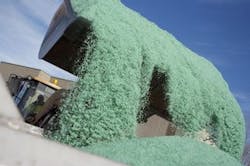Webster, Mass., finds a way to go light on the budget, environment, with its winter-maintenance practices
Up until a few years ago, the town of Webster, Mass., utilized traditional road deicing methods such as sand and salt. When Kenneth Pizzetti took the reins as street superintendent, however, he was looking for more modern snowfighting practices. Soon the town’s deicing strategy took a more innovative turn by implementing an enhanced deicing product and cutting sand completely out of their winter-maintenance budget.
“With this deicer product we found we just didn’t need the sand, so we didn’t buy any,” Pizzeti said. “Right out of the gate we came out with a $30,000 savings.”
Pizzetti discovered the enhanced deicer while attending a state and county highway association meeting. He listened to a presentation from a neighboring community that had implemented the product, which resulted in effectively clearing their winter roads and significantly reducing their salt and sand use.
“This new product really caught my attention because it was so modern—most of us in the area still used salt, sand, chloride and magnesium chloride,” Pizzetti said. “This new product worked so much better than rock salt because it melted the roads faster.”
The product implemented by Pizzetti and the town of Webster is called ClearLane enhanced deicer. Produced by Cargill Deicing Technology, the enhanced deicer is a salt product that’s different than regular rock salt because it contains a pre-wetting agent. Made with chemical and natural additives, the pre-wet feature helps clear roads by providing a faster reaction time and longer residual effects.
As well as budget, additional concerns for Webster regarding modernizing its deicing practices for included environmental impact. Operating a system of wells throughout the town and residing along the shores of Lake Chaubunagungamaug (commonly referred to as Webster Lake), preventing watershed contamination was a top concern for Webster residents and city officials.
“We have gravel pack wells, we have a street pump system, we have the lake, we have basins; we needed to make sure our water-management practices weren’t being compromised by our winter-maintenance practices,” Pizzetti said.
